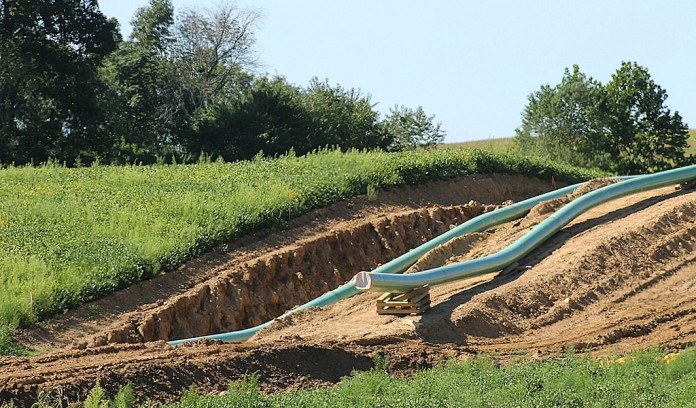SALEM, Ohio — The Federal Energy Regulatory Commission has issued its final Environmental Impact Statement for the Nexus Gas Transmission pipeline, a sign that the project is on its way to approval and construction.
The proposed route runs diagonally across Ohio, beginning in the eastern Ohio town of Kensington, and crossing portions of Stark, Summit, Wayne, Medina and Lorain Counties, as it continues into northwestern Ohio, and then into lower Michigan.
Moving ahead
In a statement to media, Nexus said the action is a “major project milestone,” keeping it on track with previous timelines.
The Nexus project, owned by Spectra Energy, will now look to FERC to approve the project’s Certificate of Public Convenience and Necessity, which Nexus expects will come in the first quarter of 2017.
According to FERC, the project would result in about 210 miles of new 36-inch diameter natural gas pipeline in Ohio, and 47 miles of the same pipeline into Michigan. It would carry about 1.5 billion cubic feet of natural gas a day from the Marcellus and Utica shale regions, to markets across Ohio, Michigan and into Canada.
The project also includes above-ground facilities, including four new compressor stations in Ohio, as well as metering and regulating stations.
Concerned landowners
The pipeline has been an intensely debated topic for many landowners, who fear the long-term consequences. The city of Green, located between Akron and Canton, had proposed several route changes, but FERC ultimately found Nexus’s route acceptable.
Nexus said that during the planning phase, it adopted nearly 240 route changes, in response to landowner requests, sensitive resources and engineering considerations.
The company has conducted environmental surveys, studies and planning for the route, since August of 2014.
Nexus also says its new pipeline will generate millions of dollars in tax revenue for Ohio and Michigan. According to a study by Michigan State University, the line will also generate nearly 7,000 jobs and $830 million in total activity.
Adverse effects
In its report, FERC did note that the line will “result in some adverse environmental impacts,” but said the impacts “would be reduced to less-than-significant levels” because of the mitigation actions NEXUS has vowed to take.
According to FERC, the land disturbed during construction, that is not permanently occupied, would be restored and allowed to revert to its former use.
FERC recommendations:
(The conclusions and recommendations presented in the EIS were made by the FERC environmental staff, with input by the U.S. Environmental Protection Agency, U.S. Army Corps of Engineers, and the U.S. Fish and Wildlife Service.)
• FERC said NEXUS has plans in place to control erosion, segregate topsoil, enhance successful revegetation and crop activity. But the commission also recommends that Nexus file an impact mitigation plan with the Secretary an Agriculture, detailing construction and restoration measures to address agricultural issues unique to Ohio and Michigan.
• FERC also recommends that NEXUS file a 5-year postconstruction monitoring program to evaluate crop productivity in areas impacted by construction.
Based on these measures, FERC concludes that “construction of the projects would not significantly alter the soils of the region.”
• The Nexus project crosses four certified organic farms and several specialty crop lands. Nexus developed an Organic Farm Protection Plan to address prohibitions on substances allowed on farm property (both during construction and operation); soil handling procedures; erosion control and buffers; off right-of-way water migration; noxious weed and invasive species control; mitigation/restoration methods; post-construction monitoring; compensation for construction-related damages; and damages due to decertification. The commission said it reviewed the plan and finds it acceptable.
• Operation of the Nexus Project would affect 96.8 acres of specialty crops. NEXUS would compensate landowners for any project-related damages and lost production on organic farms and specialty crop lands.
• The Nexus project crosses multiple parcels of land that are enrolled in the Current Agricultural Use Value (CAUV) program, the Ohio Forest Tax Law program, or are protected by conservation easements. The project also crosses a number of areas enrolled in a variety of Farm Service Agency (FSA) enrolled land including CRP/CREP lands.
• On program lands where tree clearing is necessary, Nexus would reimburse the landowner the fair market value for any loss of crop or timber for any area disturbed due to the construction of the pipeline. Also, Nexus would work with landowners and local program officials to determine how the crossing of enrolled lands by the pipeline affects the continued participation in the program by landowners.
Related coverage:











Was there ever any doubt of the outcome? FERC is a good old boys club whose funding comes from the very companies seeking project approval. Check it out! There is nothing FEDERAL about the federal energy regulatory commission, they are funded by the companies seeking project approval. There has never been a better pay to play scheme! They are poisoning us so they can profit from exporting gas, plain and simple!
4 organic farms? There goes their certifications! Fair compensation for timber…yeah right! Ask the Halloran family in NE Pa about that! Armed Federal Marshals held peaceful activists at bay while their sugar bush was destroyed, tree after felled for a pipeline that didn’t have approval in NY and was eventually denied. They laid waste to the maple syrup business with no regard for the family business and no compensation, either! Fight this monster with everything you have! Contact activists at Jordan cove in Oregon to find out how they did it. Gov. Cuomo in NY denied the pipeline permit, doubt Kascik would do the same. Stand up! Fight back! It’s your safety, your water, your land and they have no right to ruin it or put you in jeopardy!